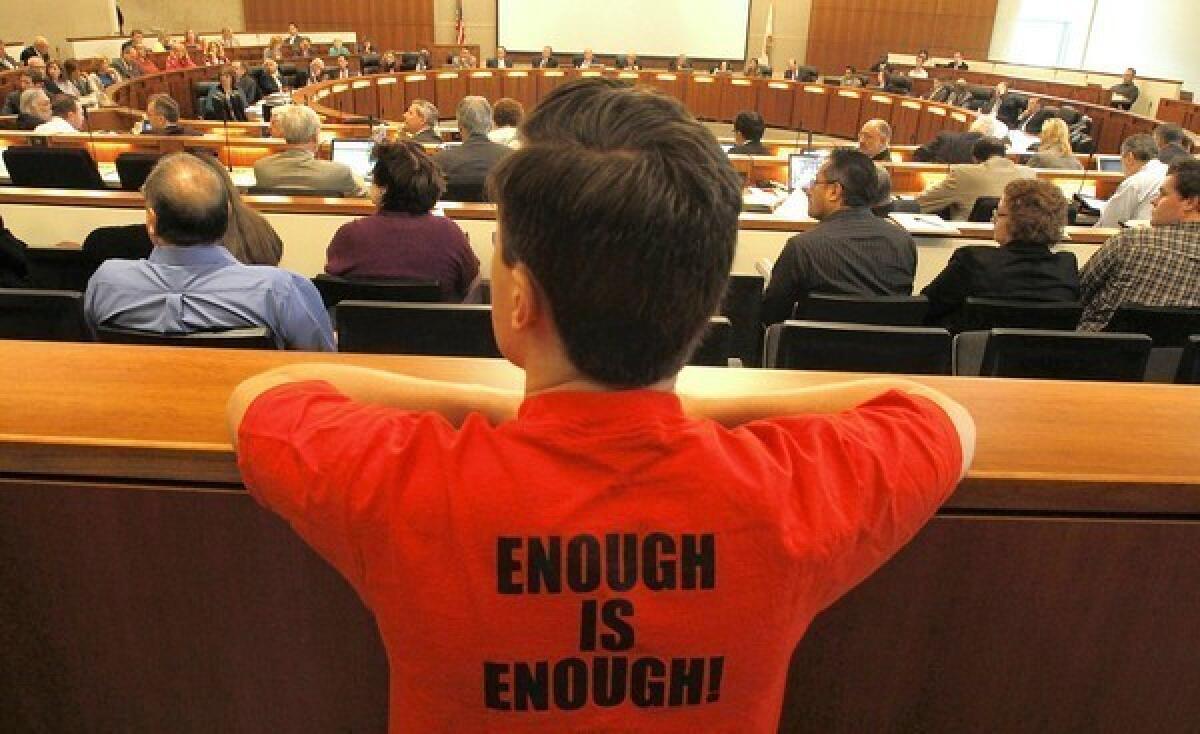Cal State University seeking new fees next fall

- Share via
California State University is seeking to impose a series of new fees on some students next fall designed to encourage them to graduate faster and free up thousands more classroom seats.
The proposals were released Thursday, two days after the passage of Proposition 30, a tax measure that allowed the university to rescind a $249-per-semester tuition increase that took effect in the fall. Voter approval of the proposition means the university will avoid a $250-million funding cut in January, after absorbing a $750-million cut last year.
The new plan would raise about $30 million in annual revenues, mainly by increasing enrollment, officials said. Cal State’s 23 campuses serve about 427,000 students. Annual undergraduate tuition is set at $5,472.
Officials said the fees are not intended primarily to generate money but to change student behaviors that have clogged the pathway to degrees and reduced new admissions, problems that have been exacerbated by budget cuts. The plan was presented to the Board of Trustees in September but was held for review and input from students and campus administrators.
The proposed fees include:
• A per-unit supplement of $372 for “super seniors” who have already accumulated 160 semester units. In 2014, the supplement would apply to students who have earned 150 semester units. Currently, about 6% of seniors — 9,000 students — fall into the super senior category.
• A $91-per-unit fee for students who want to repeat a class. Campuses estimate that each term, about 40,000 classroom seats are occupied by those who have already taken the course.
• A $182-per-unit fee for any course load of 18 units or more, which is intended to discourage students from enrolling in classes they will drop later. About 22,000 students now fall into that category.
Officials said the plan would allow about 18,000 additional students to be admitted. Students also would be expected to save about $4,000 in tuition, campus-based fees, books and supplies for each semester they shorten their time in school. Officials said they expect that relatively few students would end up paying the fees but instead make better choices when deciding on courses.
“Campuses continue to receive many more applications from students than they can serve,” said Ephraim P. Smith, Cal State’s executive vice chancellor and chief academic officer. “We’re turning away 20,000 eligible students each year. The passage of Proposition 30 helps but does not solve all of our financial problems. It is critical that we look for new ways to be efficient.”
The proposals will be considered by the trustees during their scheduled meeting next week in Long Beach.
Many students argue that new fees will unfairly punish those who switch majors or face other obstacles. The activist group Students for Quality Education is holding protests at several campuses this week and plans to demonstrate at next week’s board meeting.
“We don’t have enough classes, not enough sections are being offered and now they want to punish us with extra fees,” said Carol Linton, 23, a sociology major at Cal State Dominguez Hills.
Linton said the six classes she needs to graduate by next spring would put her close to or over 18 units. She also wants to retake a class in her major to improve her grade-point average and her chances at being admitted to a good graduate school.
“They argue that students are trying to game the system, but I would have to drop out,” Linton said. “I wouldn’t have the money to go to school.”
More to Read
Sign up for Essential California
The most important California stories and recommendations in your inbox every morning.
You may occasionally receive promotional content from the Los Angeles Times.











